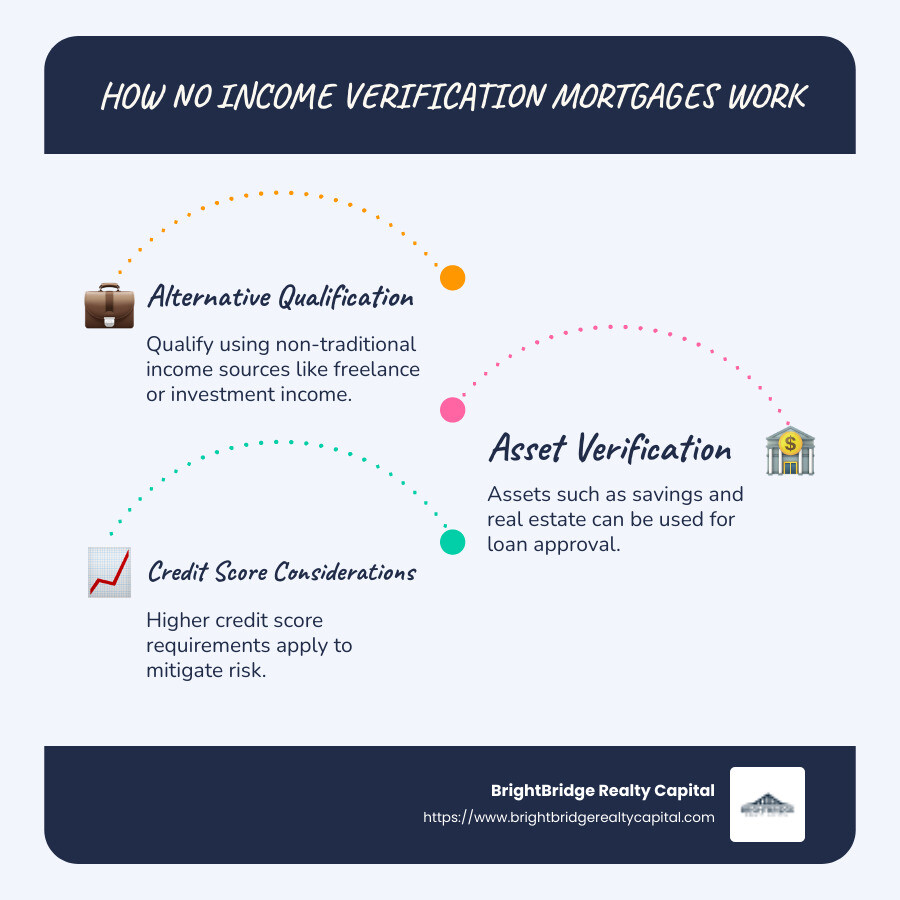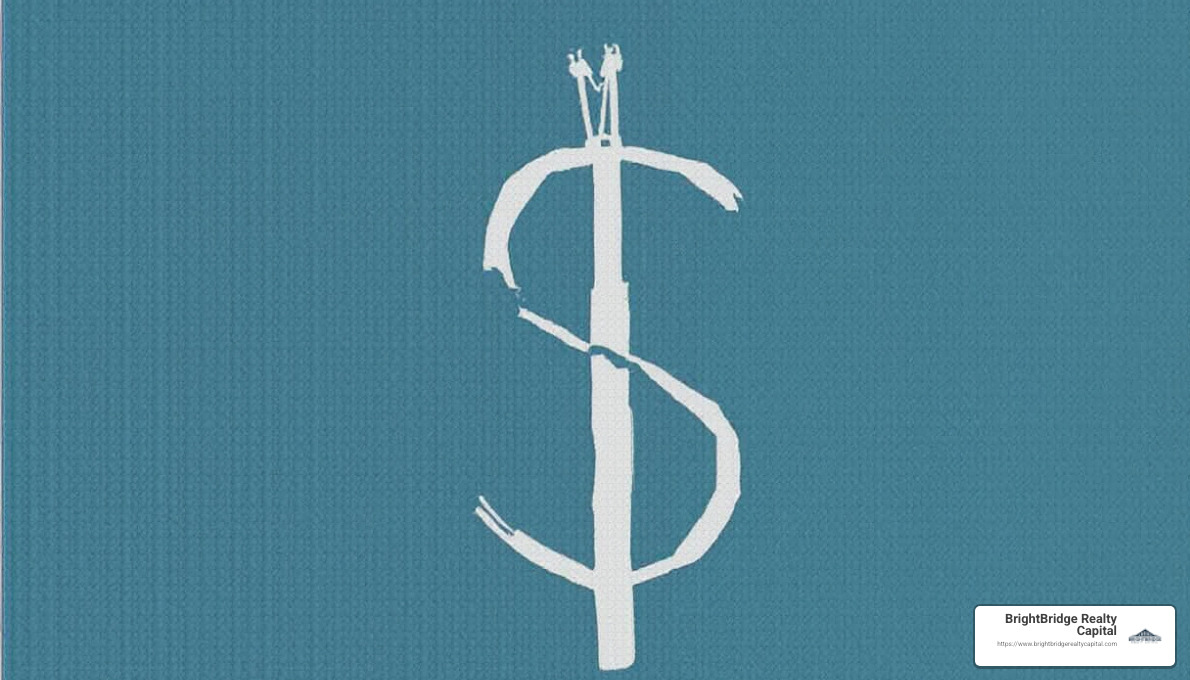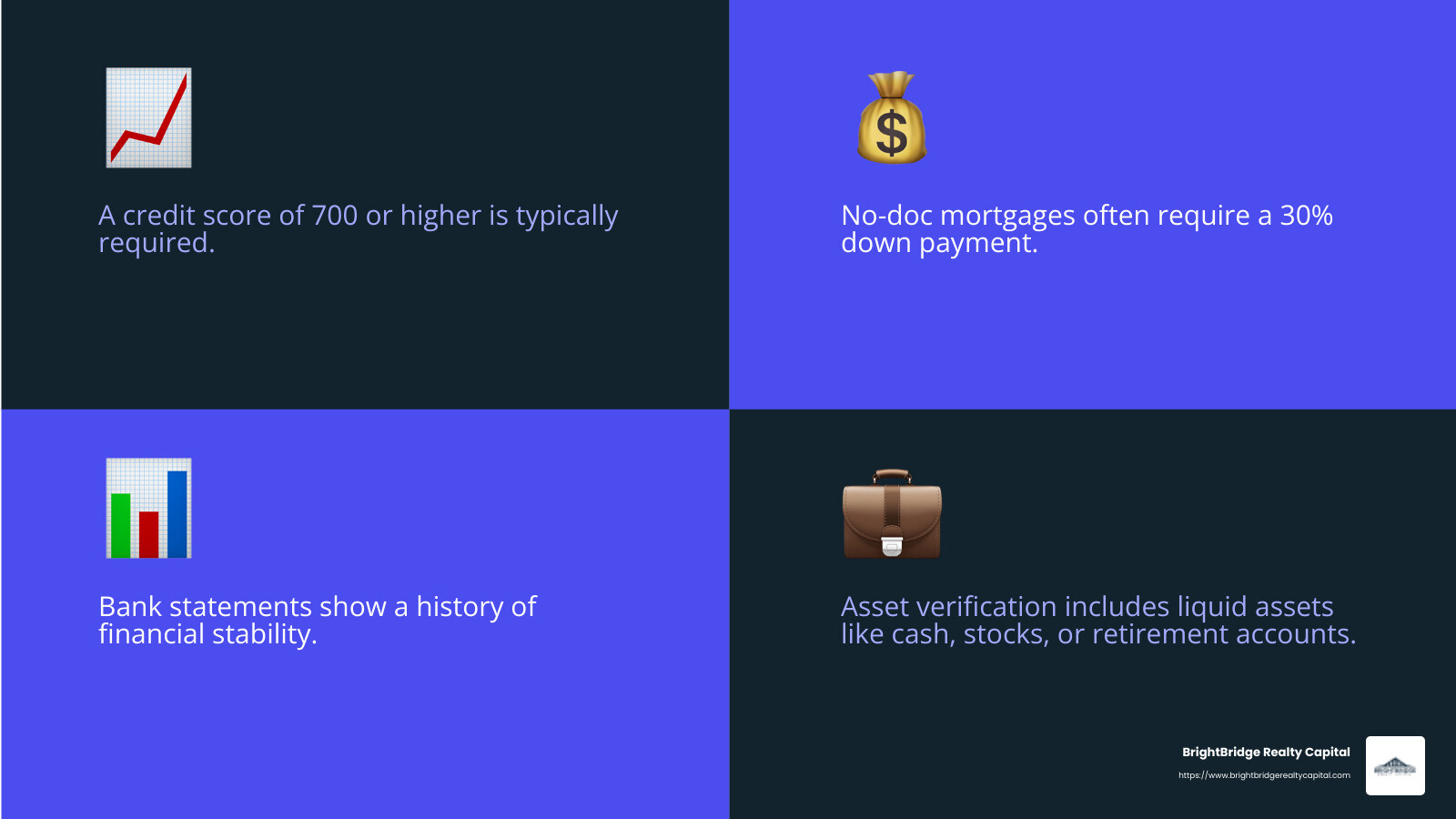The No-Doc Mortgage: A Guide to No Income Verification Loans

No income verification mortgage—a phrase that catches the attention of many real estate investors looking for swift and flexible financing solutions. These loans offer a compelling path for those who have non-traditional income streams and seek to bypass the usual exhaustive documentation requirements.
- What is it? A no income verification mortgage allows you to qualify for a home loan using alternative methods instead of traditional financial documents like tax returns or W-2s.
- Who benefits? Real estate investors, self-employed individuals, or anyone with irregular income who finds conventional loans frustratingly slow and restrictive.
- Why consider it? Fast approvals and flexible documentation make these loans appealing, particularly for those aiming to capitalize quickly on time-sensitive investment opportunities.
In today's real estate market, where timing can make or break a deal, these no-doc mortgage options stand out as a crucial tool for savvy investors. Although they come with their own set of challenges, such as potentially higher interest rates and stricter credit score requirements, the benefits often outweigh the downsides for those who need to move quickly and efficiently.
As we dig further into no income verification mortgages, we'll explore how these loans work, their advantages and disadvantages, and alternative options available.

Quick look at no income verification mortgage:
Understanding No-Doc Mortgages
Types of No-Doc Mortgages
No-doc loans are a game-changer for those with non-traditional income sources. These loans offer a way to secure financing without the typical paperwork, making them a popular choice for self-employed borrowers and real estate investors.
Let's break down the different types of no-doc mortgages:
Stated-Income Loans (SISA):
Borrowers state their income without providing traditional proof like pay stubs or tax returns. The lender verifies the borrower's assets to ensure they can repay the loan. This option is ideal for those with fluctuating income who can still demonstrate financial stability through their assets.Stated-Income, Verified-Assets Loans (SIVA):
Similar to SISA, but with a stronger emphasis on asset verification. This is a great choice for self-employed individuals who have significant savings or investments but can't easily verify their income through conventional means.No-Income, Verified-Assets Loans (NIVA):
These loans focus solely on the borrower's assets, ignoring income altogether. They're perfect for those with substantial liquid assets, like stocks or retirement accounts, who may not have a steady paycheck.No-Income, No-Asset Loans (NINA):
NINA loans are rare and typically rely on rental property income to ensure loan repayment. This option is often used by real estate investors who are confident that rental income will cover the mortgage payments.NINJA Loans:
Once prevalent before the Great Recession, NINJA loans required no income, job, or asset verification. Due to the high risk associated with these loans, they have nearly vanished from the market today.

No-doc loans offer flexibility and speed, but they also come with higher interest rates and stricter credit score requirements. These loans are not for everyone, but for those who need them, they can be a powerful tool in the world of real estate investment.
We'll dive deeper into how no income verification mortgages function, discuss their pros and cons, and explore alternative options.
How No Income Verification Mortgages Work
No income verification mortgages, often called no-doc loans, offer a unique way to secure financing without the traditional income documentation. Here's how they work in today's market:
Modern No-Doc Mortgage Requirements
1. Income Estimate and Asset Verification
While no-doc loans don't require traditional income documentation like W-2s or pay stubs, borrowers still need to provide an income estimate. This estimate is typically supported by bank statements or other financial documents that show a history of financial stability.
For example, if you're self-employed, you might use 12 to 24 months of bank statements to demonstrate your income flow. In addition to income estimates, asset verification is crucial. Lenders will want to see proof of substantial liquid assets, such as cash savings, stocks, or retirement accounts, to ensure you have the means to repay the loan.
2. Credit Score Requirements
A strong credit score is essential for no income verification mortgages. Most lenders require a minimum score of 700 or higher. This high standard is because lenders view these loans as riskier due to the lack of income documentation. A high credit score reassures lenders of your creditworthiness.
3. Down Payment
No-doc mortgages often require a larger down payment compared to traditional loans. Expect to put down at least 30% of the home's purchase price. This high down payment reduces the lender's risk and shows your commitment to the investment.
4. Bank Statements
As mentioned, bank statements are a vital part of the no-doc loan application process. They provide a snapshot of your financial health and help verify your income and asset claims. Lenders typically review these statements to ensure consistent cash flow and sufficient reserves.

No income verification mortgages offer flexibility for those with non-traditional income sources. But they come with specific requirements, including a strong credit score, significant down payment, and thorough asset verification. These measures help lenders manage the higher risk associated with these loans.
Next, we'll explore the pros and cons of no income verification mortgages, helping you decide if this option is right for you.
Pros and Cons of No Income Verification Mortgages
No income verification mortgages, often called no-doc loans, present both opportunities and challenges. Let's break down the key advantages and disadvantages.
Pros
1. Flexibility
These mortgages are a breath of fresh air for those with non-traditional income sources. Whether you're self-employed, a freelancer, or someone with multiple income streams, no-doc loans offer the flexibility you need. You don't have to rely on traditional income documentation like W-2s or pay stubs. Instead, you can use alternative methods like bank statements or asset verification to prove your financial stability.
2. Quick Approval
The quick approval process is another major plus. Without the need for extensive documentation, lenders can process applications faster. This means you can move into your new home or secure an investment property without the usual delays.
3. Diverse Income Sources
No income verification mortgages recognize the reality of today's workforce. They allow you to qualify using diverse income sources, such as freelance work, consulting gigs, or part-time jobs. This inclusivity is especially beneficial in states like Florida, where many individuals rely on flexible income streams.
Cons
1. Higher Interest Rates
One downside is the higher interest rates associated with these loans. Because lenders see them as riskier, they often come with steeper rates compared to traditional mortgages. This can increase your overall borrowing costs.
2. Limited Availability
Finding a lender that offers no-doc loans can be a challenge. Limited availability means you might have to shop around more to find the right lender. However, companies like BrightBridge Realty Capital specialize in these loans, making the search easier.
3. Stricter Credit Requirements
Despite the lack of income documentation, these loans still require a strong financial profile. Expect stricter credit requirements, with most lenders asking for a credit score of 700 or higher. This ensures that only financially stable borrowers qualify, reducing the lender's risk.
In summary, no income verification mortgages provide a valuable option for those with non-traditional income. But they come with higher interest rates, limited availability, and stricter credit requirements. Understanding these pros and cons will help you decide if this mortgage option suits your needs.
Next, we'll explore alternatives to no-doc mortgages to give you a broader view of your financing options.
Alternatives to No-Doc Mortgages
While no income verification mortgages offer unique benefits, they might not be the right fit for everyone. Fortunately, there are several alternatives that cater to different financial situations. Let's explore three popular options: bank statement loans, asset-based mortgages, and DSCR loans.
Bank Statement Loans
Bank statement loans are designed for individuals who receive income through non-traditional means. Instead of relying on tax returns or W-2s, lenders look at 12 to 24 months of your bank statements to determine your qualifying income.
Who Benefits?
- Self-employed individuals: Freelancers, small business owners, and gig workers often have fluctuating monthly incomes. Bank statement loans provide a way to showcase their financial stability.
- Those with regular deposits: If you have consistent deposits in your bank account, this loan type can work well for you.
How It Works
- Lenders analyze your bank statements to calculate an average monthly income.
- You'll need a decent credit score, typically around 620 or higher.
- A down payment of at least 10% is usually required.
Asset-Based Mortgages
Asset-based mortgages, also known as asset-depletion loans, use your assets to determine your loan eligibility. This is particularly useful for high-net-worth individuals with substantial savings or investments.
Who Benefits?
- Retirees: Individuals living off their savings or investment accounts can qualify without traditional income.
- High-net-worth individuals: Those with significant assets in liquid accounts can use these to qualify for a mortgage.
How It Works
- Lenders calculate your qualifying income by dividing your total assets by the loan term.
- A strong credit score and a substantial asset base are crucial for approval.
DSCR Loans
Debt Service Coverage Ratio (DSCR) loans are ideal for real estate investors. These loans focus on the property's income potential rather than the borrower's personal income.
Who Benefits?
- Real estate investors: Those purchasing rental properties can use the anticipated rental income to qualify.
- Investors with high down payments: A larger down payment can make it easier to secure DSCR loans.
How It Works
- The property's rental income is compared to the mortgage payment to determine eligibility.
- No personal income documentation is required, but a strong credit profile is essential.
Each of these alternatives offers a unique approach to mortgage qualification, catering to different financial scenarios. Whether you're self-employed, have significant assets, or are a real estate investor, there's likely a mortgage option that fits your needs. Next, we'll address some frequently asked questions about no income verification mortgages to help clarify any remaining uncertainties.
Frequently Asked Questions about No Income Verification Mortgages
What is a no-doc mortgage?
A no-doc mortgage, short for "no documentation mortgage," is a home loan that doesn't require traditional income verification. Instead of providing pay stubs, W-2s, or tax returns, borrowers may use alternative documentation like bank statements or asset declarations. This type of mortgage is ideal for those with non-traditional income sources, such as freelancers, business owners, or retirees. These loans were more common before the 2008 financial crisis but are now more niche and come with stricter requirements.
Who qualifies for a no-doc mortgage?
To qualify for a no-doc mortgage, borrowers typically need:
- A high credit score, often 700 or above.
- A substantial down payment, usually 30% or more of the property's value.
- Significant liquid assets or alternative income sources.
- A strong financial background, often appealing to real estate investors or high-net-worth individuals.
These mortgages are not typically available to the average borrower. Instead, they cater to those with unique financial situations, like entrepreneurs with fluctuating income or those who can't easily provide traditional income documentation.
Are no-doc mortgages still available?
Yes, no-doc mortgages are still available, but they're not as widespread as they once were. After the 2008 financial crisis, regulations tightened, making these loans less common. However, they still exist as part of the non-qualified mortgage market. Lenders offering these loans must adhere to the ability-to-repay rule, ensuring borrowers can meet their mortgage obligations. While fewer lenders provide these options, companies like BrightBridge Realty Capital continue to offer custom solutions for those with unique financial situations.
Conclusion
At BrightBridge Realty Capital, we understand that traditional lending isn't always the best fit for everyone. That's why we offer customized financing solutions custom to meet the unique needs of our clients. Our focus is on providing flexible, quick funding options, especially for those interested in no income verification mortgages.
Our approach is simple: we prioritize speed and efficiency. We know that in the real estate market, timing is everything. That's why our fast closings, often within a week, set us apart. By cutting out intermediaries, we ensure a seamless process and offer competitive rates that are hard to beat.
Whether you're a real estate investor, self-employed, or someone with non-traditional income sources, we've got you covered. Our no-doc mortgage options cater to those who need flexibility and quick approval without the hassle of traditional income documentation.
For more information on how we can help bridge your financing needs, visit our BrightBridge Realty Capital service page. Let us help you turn your real estate goals into reality with our expert support and custom solutions.


